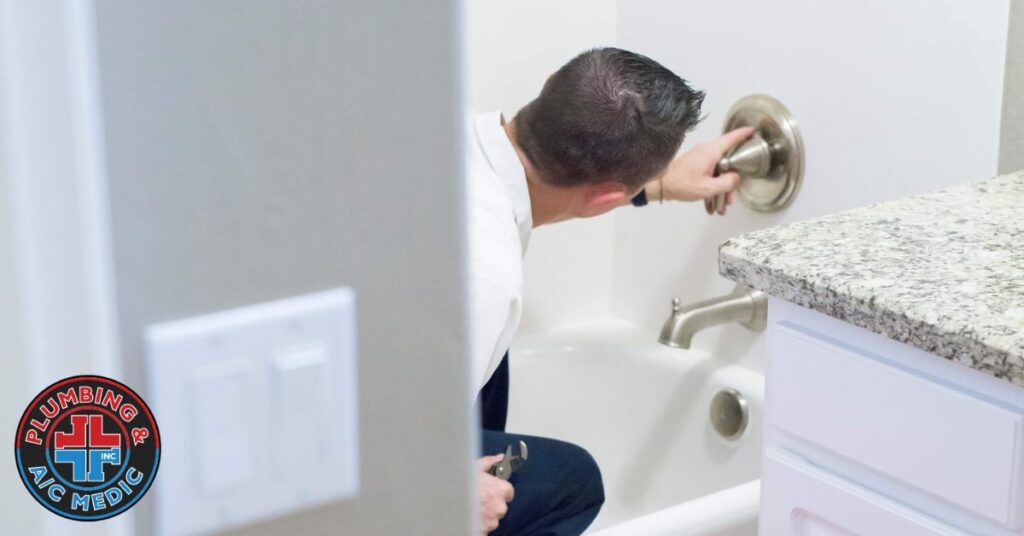Handling Your New Home's Bathroom Plumbing: Key Guidelines
Handling Your New Home's Bathroom Plumbing: Key Guidelines
Blog Article
We have stumbled on this great article about Smart Plumbing Tips for New Homeowners directly below on the net and felt it made good sense to write about it with you here.

For new house owners, understanding and keeping bathroom plumbing can save both money and time by avoiding costly problems down the line. Here are some essential bathroom pipes suggestions to aid you maintain every little thing running efficiently.
Acquaint Yourself with the Main Shut-Off Valve
Recognizing where the major water shut-off valve lies in your home is important. This enables you to quickly turn off the water supply in case of significant leaks or throughout pipes emergencies, avoiding considerable water damage.
On A Regular Basis Inspect for Leakages
Small leaks can bring about huge troubles. Frequently examine under sinks, around toilets, and near plumbing components for any indications of leakages. Look for moisture, tiny drips, or rust. Capturing and fixing leaks early can avoid more serious damages and save water.
Don't Ignore Slow Drains Pipes
If your sink or tub is draining pipes slowly, it's frequently an indication of an obstruction creating. Resolving this very early can stop a full obstruction. Utilize a plunger or a plumbing technician's snake to remove particles. Prevent using chemical drain cleaners as they can harm your pipes over time.
Know What Not to Flush
Commodes are not waste disposal unit. Avoid flushing anything apart from toilet paper and human waste. Products like wipes, feminine health products, and cotton bud must be disposed of in the garbage to avoid blockages and sewage system back-ups.
Install Strainers in Drains
Area strainers in your sink and bathtub drains to capture hair and various other debris prior to they enter your plumbing system. Cleansing the strainers on a regular basis will aid protect against buildup and keep water streaming easily.
Keep Your Water Heater
Guarantee your hot water heater is set to a proper temperature (normally about 120 levels Fahrenheit) to stop scalding and minimize power usage. Flush the storage tank annually to eliminate debris buildup, which can minimize the efficiency and lifespan of your heating unit.
Upgrade Your Components
If your home has older fixtures, think about upgrading to a lot more reliable designs. Modern toilets, showerheads, and taps are designed to use much less water while giving good pressure, which can significantly decrease your water costs and ecological footprint.
Beware with DIY Pipes Services
While it's tempting to manage all home repair work by yourself, be cautious with plumbing. Some concerns could need specialist experience, particularly if they involve primary water lines or sewer fixings. Hiring an expert can sometimes be much more economical than do it yourself, specifically if it avoids additional damage.
Plan For Winter
Protect your pipes from freezing during cold weather by shielding pipelines in unheated areas like cellars, attics, and garages. During extreme cool, allow cold water drip from faucets offered by exposed pipelines to aid prevent freezing.
Schedule Routine Upkeep
Take into consideration scheduling yearly examinations with an accredited plumbing. They can identify issues that you might miss out on, such as surprise leakages or deterioration on pipes and fixtures. Regular upkeep assists prolong the life of your plumbing system and can avoid emergencies.
Final thought
Comprehending and keeping your home's bathroom plumbing can prevent lots of typical concerns. By complying with these necessary suggestions, you can ensure your shower room stays functional and reliable, conserving you time and money in the future.
Essential Plumbing Tips for Homeowners: Keep Your Pipes Flowing Smoothly
As a homeowner, understanding the basics of your plumbing system can save you time, money, and a lot of headaches. Plumbing issues can range from minor annoyances like dripping faucets to major problems like burst pipes that cause significant damage. This guide provides essential tips to help you maintain your plumbing system and tackle common issues.
Understanding Your Plumbing System
Supply System: Brings fresh water into your home from a municipal source or a well. Drain-Waste-Vent System: Removes wastewater and vents sewer gases outside. Fixtures and Appliances: Includes sinks, toilets, showers, dishwashers, and washing machines. Basic Maintenance Tips
Regular Inspections: Periodically check for leaks, corrosion, and other signs of wear and tear. Look under sinks, around toilets, and near water heaters. Know Your Main Shut-Off Valve: In case of a major leak, you’ll need to shut off the water quickly. Ensure everyone in your household knows where the main shut-off valve is located. Prevent Frozen Pipes: In cold climates, insulate exposed pipes and let faucets drip during extreme cold to prevent freezing. Use Strainers: Install strainers in sinks and tubs to catch hair, food particles, and other debris that can cause clogs. Common Plumbing Issues and Solutions
Clogged Drains:
Prevention: Avoid pouring grease down the drain and use drain screens to catch debris. DIY Fix: Use a plunger or a plumbing snake to clear minor clogs. For stubborn clogs, a mixture of baking soda and vinegar can sometimes help. Leaky Faucets:
Prevention: Replace washers and seals regularly. DIY Fix: Turn off the water supply, disassemble the faucet, and replace worn parts.

Call Today Report this page